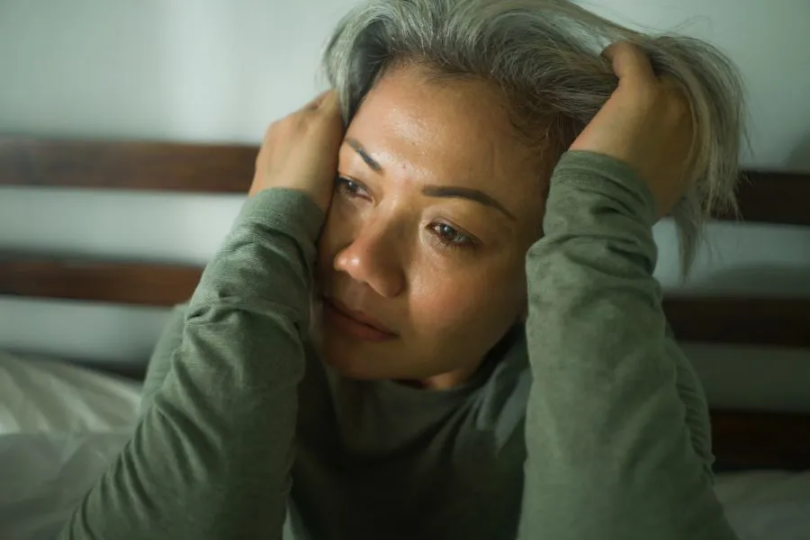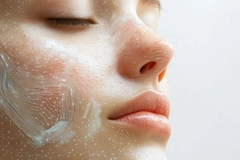Menopause and mental health: Health & Her identifies innovation gap
Key takeaways
- Mental and emotional symptoms are found to have a greater impact on women’s well-being during menopause than physical ones.
- Health & Her says public awareness and education on menopause remain limited, especially regarding mood and cognitive effects.
- The personal care industry has an opportunity to innovate with science-backed solutions that address emotional and cognitive health.

Health & Her has uncovered that mental, cognitive, and emotional symptoms from menopause take a larger toll on well-being than physical ones. Each year in the US, approximately 2 million women enter perimenopause and another 1.3 million enter menopause.
The female health and wellness company compiled research from over 19,000 US women experiencing perimenopause and menopause, showing that low energy (79%) and sleeping problems (74%) were the most prevalent symptoms.
Based on the findings, Kate Bache, CEO and founder of Health & Her, says the personal care industry should pay greater attention to emotional health.
“There is movement in the space, but more innovation is needed, especially for mental and cognitive symptoms and integrative, evidence-backed solutions,” she tells Personal Care Insights.
Health & Her’s research seeks to advance the understanding of women’s hormonal changes to improve support during menopause.
The Health & Her Centre for Research, in collaboration with Cardiff University, UK, recently conducted a systematic scoping review analyzing longitudinal data on menopausal symptoms and long-term health outcomes.
 Studies reveal that mood and sleep issues during menopause can increase long-term cognitive risks. The findings revealed that mood and sleep-related symptoms during menopause significantly increase the risk of cognitive decline in the years that follow.
Studies reveal that mood and sleep issues during menopause can increase long-term cognitive risks. The findings revealed that mood and sleep-related symptoms during menopause significantly increase the risk of cognitive decline in the years that follow.
“This evidence highlights an important gap, while many products currently focus on physical symptoms such as hot flushes or skin changes, fewer target the interconnected mental, emotional, and cognitive aspects of menopause that can have lasting impacts on women’s health and quality of life,” Bache says.
Seasonal sensitivity
Another nationwide study by Health & Her revealed that mood and cognitive symptoms — including low mood, stress, anxiety, and brain fog — peak during the winter. However, autumn showed the broadest range of heightened symptoms across participants.
The findings suggest that seasonal shifts may play a more significant role in women’s hormonal well-being than previously understood, shedding new light on how environment and lifestyle can influence menopause experiences year-round.
“This highlights the importance of supporting women with more than just symptom relief. By focusing on balanced nutrition, energy, and emotional well-being, we can empower women to manage the changing seasons of perimenopause and menopause with greater resilience and confidence,” says Bache.
A 2025 survey of approximately 30,000 Health & Her App users indicates that US women experiencing mood-related symptoms tend to have a significantly higher overall symptom burden. Those who reported mood symptoms experienced an average of 13 perimenopausal or menopausal symptoms, compared to only six symptoms among women without mood disturbances.
Moreover, the group with mood symptoms also reported greater severity across nearly all other menopausal symptoms, suggesting that mental health changes are closely linked with, and may amplify, the broader physical and emotional experience of menopause.
Health & Her argues that the public may not yet be aware that mental symptoms impact women more greatly than physical ones. “Public awareness is strongly skewed toward classic physical symptoms such as hot flashes, night sweats, vaginal dryness, and is less aware of the mental symptoms,” says Bache.
“This understanding has not yet become widespread in general knowledge, highlighting the need for continued education and awareness.”.webp) Health & Her highlights how mood and sleep disturbances shape well-being during menopause.
Health & Her highlights how mood and sleep disturbances shape well-being during menopause.
Science-backed industry response
Bache cites emerging research showing that aromatherapy and olfactory stimulation can help relieve stress, anxiety, sleep disturbance, and vasomotor symptoms. The findings illuminate solutions for the personal care industry when creating menopause care.
Clinical studies have demonstrated benefits from lavender oil for reducing hot flushes and improving mood and sleep. Blends containing rose, geranium, and jasmine have also shown improvements in depressive mood and vasomotor symptoms.
More recently, a 2024 neuroimaging study found that women who wore rose essential oil daily for 30 days experienced increased gray matter volume, particularly in the posterior cingulate cortex — a region associated with emotion, memory, and cognition.
“These kinds of new findings could help the personal care industry to create solutions that support women not only physically but also mentally, addressing the often-overlooked emotional and cognitive dimensions of menopause,” explains Bache.
Skin health solutions
Skin health undergoes significant changes during menopause due to the natural decline in oestrogen levels. Research shows that women can lose up to 30% of their skin collagen after menopause.
The decline in oestrogen reduces dermal collagen, thins the skin, and increases dryness and water loss, leading to visible signs such as wrinkling, sagging, and reduced elasticity.
Bache says these changes are often mistaken for normal aging rather than recognized as the result of hormonal shifts.
“The industry can help to close this knowledge gap by incorporating research-based info to explain menopause skin, partnering with dermatologists, endocrinologists, and menopause specialists to raise awareness and advance understanding of menopausal skin health,” she explains..webp) Seasonal changes may intensify mood and cognitive symptoms in perimenopausal and menopausal women.
Seasonal changes may intensify mood and cognitive symptoms in perimenopausal and menopausal women.
Closing education gap
Evidence suggests that there is still a considerable lack of understanding among the general public in the US about how menopause affects women mentally and physically.
A recent survey of men and women across the US and Canada found that nearly one-third of respondents had little or no familiarity with perimenopause or menopause, and more than half were unaware of available treatment options.
“This highlights a significant gap in public awareness and education, suggesting that many women may enter this life stage unprepared to manage their symptoms effectively, particularly the less visible mental and emotional effects, such as mood changes, anxiety, and cognitive decline,” says Bache.
“To improve the situation, we would strongly urge the industry to arrange public education and awareness campaigns to [raise awareness of] both the physical and mental symptoms of menopause. Also, to promote menopause education in workplaces, which will ensure women can receive comprehensive support through menopause and beyond.”



















